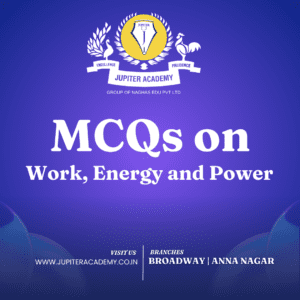NEET UG 2024 Re-Test result NTA Had Conducted the Re-test...
Read More
Work energy and power MCQs are the most commonly used terms in Physics.
Thank you for reading this post, don't forget to subscribe!Work is defined as the transfer of energy. In Physics, work is said to be done when there is a transfer of energy from one body to another. Also, work is an application of force.
Energy is defined as the capacity to do work. Kinetic energy and potential energy are the two types of energy. While heat energy, mechanical energy, chemical energy are the forms of energy.
Power is defined as the work done in unit time.

Work Energy and Power MCQ for NEET
These questions are designed to test your understanding of the topic. Please note that these are not actual NEET exam questions but can help you practice. Remember to consult updated study materials for the most accurate and relevant information. Here are the MCQs:
1. MCQ: Which of the following is a scalar quantity?
a) Force
b) Work
c) Power
d) Momentum
Answer: b) Work
2. MCQ: The energy possessed by an object due to its motion is called:
a) Kinetic energy
b) Potential energy
c) Mechanical energy
d) Internal energy
Answer: a) Kinetic energy
3. MCQ: The SI unit of work is the same as the SI unit of:
a) Energy
b) Power
c) Force
d) Momentum
Answer: a) Energy
4. MCQ: Gravitational potential energy depends on:
a) The mass of the object only
b) The height of the object above the reference level only
c) Both the mass and height of the object
d) The velocity of the object
Answer: c) Both the mass and height of the object
5. MCQ: Which of the following statements is true about conservation of mechanical energy in a system?
a) Mechanical energy is always conserved, regardless of external forces.
b) Mechanical energy is only conserved in the absence of non-conservative forces, like friction.
c) Mechanical energy is never conserved; it always decreases over time.
d) Mechanical energy conservation depends on the shape of the object.
Answer: b) Mechanical energy is only conserved in the absence of non-conservative forces, like friction.
6. MCQ: The rate at which work is done or energy is transferred is known as:
a) Work
b) Energy
c) Power
d) Force
Answer: c) Power
7. MCQ: The work-energy theorem states that:
a) Work done by non-conservative forces is equal to the change in kinetic energy.
b) Work done by conservative forces is equal to the change in potential energy.
c) The total mechanical energy of a system is conserved.
d) Work done is always zero if the displacement is perpendicular to the force.
Answer: a) Work done by non-conservative forces is equal to the change in kinetic energy.

These questions are designed to test your understanding of the topic. Please note that these are not official JEE exam questions but can help you practice. Remember to refer to updated study materials for the most accurate and relevant information. Here are the MCQs:
1. MCQ: Which of the following statements is correct about the work-energy principle?
a) Work done by conservative forces is equal to the change in kinetic energy.
b) Work done by non-conservative forces is equal to the change in potential energy.
c) Work done by any force is equal to the change in mechanical energy.
d) Work done by friction is always positive.
Answer: a) Work done by conservative forces is equal to the change in kinetic energy.
2. MCQ: A ball is thrown vertically upwards. At the highest point of its trajectory:
a) Its velocity is zero, and acceleration is maximum.
b) Its velocity is maximum, and acceleration is maximum.
c) Its velocity is zero, and acceleration is zero.
d) Its velocity is maximum, and acceleration is zero.
Answer: a) Its velocity is zero, and acceleration is maximum.
3. MCQ: The potential energy of a spring when compressed or stretched is given by:
a) PE = (1/2)kx^2, where k is the spring constant and x is the displacement.
b) PE = mgh, where m is the mass, g is the acceleration due to gravity, and h is the height.
c) PE = (1/2)mv^2, where m is the mass, and v is the velocity.
d) PE = (1/2)mv^2, where m is the mass, and v is the volume.
Answer: a) PE = (1/2)kx^2, where k is the spring constant and x is the displacement.
4. MCQ: Two objects of masses m and 2m are dropped from the same height. Neglecting air resistance, which one of the following statements is true about their fall?
a) Both objects will reach the ground with the same speed.
b) The heavier object will reach the ground first.
c) The lighter object will reach the ground first.
d) The acceleration due to gravity will be different for both objects.
Answer: a) Both objects will reach the ground with the same speed.
5. MCQ: The rate of doing work is called:
a) Work
b) Energy
c) Power
d) Force
Answer: c) Power
6. MCQ: If a body moves with a constant speed in a circle, its net work done over a complete circular path is:
a) Positive
b) Negative
c) Zero
d) Not enough information to determine
Answer: c) Zero
JEE Advanced 2024 registration window opens at jeeadv.ac.in. Here is how to apply
JEE Advanced 2024 registration window opens The Indian Institute of...
Read MoreLast chance for Photo correction in NEET 2024 Forms
Last Chance for Photo Correction in NEET 2024 Forms! Don’t...
Read MoreNEET UG 2024 exam city slips out now
Registered candidates can download their city slips from the official...
Read More



